With the impending World Cup tournament in Qatar polarising support, Suzanne Stone, French teacher, considers whether a different curse of the title holder might come into play as the French national team tries to defend its crown.

‘Le compte à rebours est enclenché’ read the headlines across the French media this week, as the countdown to the 22nd World Cup kicks off in Doha this Sunday. This most unusual of World Cup competitions, unusual not only in the fact that this four-yearly summer competition finds itself starting in November, but also because alongside the anticipation of exciting, international football ahead, this World Cup has courted controversy and media scrutiny for some time. With international concerns raised on humanitarian and environmental grounds, this World Cup is indeed ‘un Mondial polémique’.
Since the World Cup was awarded to Qatar in 2010, two opposing camps have emerged – not two opposing footballing nations hoping to edge closer to the final in Doha on 18th December, but rather those who agree with Sepp Blatter’s view that ‘’Attribuer le Mondial au Qatar était tout simplement une erreur’’ and Gianni Infantino’’s view, President of FIFA, that it will be ‘’la meilleure Coupe de tous les temps’’ (1).
Holding the World Cup in Qatar has aroused criticism amongst many well-known French figures and institutions. Widely reported again in the French media lately is the alleged involvement of former President Nicolas Sarkozy in using a lunch at the Élysées Palace with a member of the Qatari royal family to influence the former President of UEFA, Michel Platini, to change his support from backing the US bid to the Qatari one. The influence of two such national figures continues to play out in the French media who still hold dear the memory of Monsieur Platini in particular as one of France’s greatest footballers of all time who not only captained the national side but managed it also.
French politicians have also been using the media to denounce the tournament in recent months. The left alliance political party, la Nupes, have made public their opposition to the World Cup (2). Jean-Luc Mélenchon, leader of the left-wing party la France Insoumise who ran for la Présidentielle earlier this year, has called for a boycott and even called the organisation of the competition ‘shameful’ (3), citing the figure of 6500 migrant workers who have died in the construction of the stadia in Qatar, although official Qatari figures state only 3 deaths (4).

Former French President François Hollande admitted that whilst the position of individual French players not to participate may be untenable, the French public are free to make up their own minds: ‘Quant aux téléspectateurs, heureusement que personne ne se trouve derrière pour lui dire ce qu’il a à faire ou pas’. (5) Indeed, some players and football associations have made up their minds and aired their views. Éric Cantona, ex-international French footballer, has been vocal in his opposition: ‘Mais le Qatar, ce n’est pas le pays du football…Ce n’est qu’une question d’argent et la façon dont ils ont traité les gens qui ont construit les stades est horrible.’ (6)
In response to FIFA’s directive to all participating nations at the beginning of November to ‘se concentrer sur le football’, ten European football federations, including Belgium, Switzerland and Germany, wrote an open letter saying that they would be openly supporting the issue of increased human rights in Qatar. La Fédération Française de Football however did not choose to sign this letter. Noël le Graël, President of the FFF, has been under continuing media scrutiny, most recently following his response to a French TV documentary highlighting the cramped and squalid living conditions of migrant workers in Doha. Complément d’Enquête, broadcast on FR2 on 10.11.22, focussed on the staff at the hotel in Doha where the French national team will be based during the tournament. ‘This is not unsanitary…If there hadn’t been any football, it would have been worse’ was his reply below:

«s’il n’y avait pas eu le foot, ça aurait été pire».
This brought an immediate reaction from the French Minister for Sport, Amélie Oudéa-Castéra the next day who, when interviewed on the radio station RTL, stated that the FFF must assume some responsibility here: ‘Il faut que la FFF prenne sa part de responsabilité.’
Elsewhere, several towns in France (Lyon, Marseille, Strasbourg, Lille, Bordeaux, Rennes, St Étienne, Limoges amongst others) have announced that they will not be showing matches on giant screens in city centres for this tournament. Many bars and restaurants in France have also united to create the website ramenezlacoupealaraison.com, encouraging cultural and social spaces to join together in voicing their criticism of the tournament by advertising alternative events during the tournament.
Media scrutiny has not just been limited to mainland France, l’Hexagone, as France’s overseas territories have also voiced their discontent. The national newspaper in la Réunion, Le Quotidien (below) has stated that out of respect of its national values it will not be covering the tournament.

In Qatar itself, the French ambassador, Jean-Baptiste Faivre, has been using the media to try to quell opposition and dispel any preconceptions about Qatar that people in France may have by reassuring the host nation: ‘La réponse est, bien sûr, non. La France ne boycottera pas la Coupe du monde.’ (7)

The debate as to whether football fans should be ‘up for the cup’ is being discussed amongst French supporters too. Around 10,000 fans are expected to make the journey to Doha, although many members of the supporters’ association Irrésistibles Français have voiced concern ranging from freedom of movement and accommodation once there. The co-founder of this association, Fabien Bonnel, stated in a recent French radio interview (8) that because of Qatar’s human rights record, he himself will not be going to the tournament nor watching any of the games. Elsewhere in neighbouring Germany, the site boycott-qatar.de has gathered signatures from thousands of supporters and many sports’ associations calling for people not just to boycott the tournament but also products from its sponsors.
So where does this lead those of us who love watching international competition such as this which showcases the skill and excitement of some of the best footballers in the world? For me, I follow the fortunes of the talented Kylian Mbappé, whose proud father is pictured below. But whether that will involve watching this Coupe du monde? I, like others, am undecided.

References:
- Libération 10.11.22
- Le Monde 23.9.22
- RTL 1.4.22
- France Info 19.9.22
- Maison de la radio conference, Demain le sport, Paris 22.9.22
- Libération 21.1.22
- Interview on Qatari TV
- Libération 2.11.22

